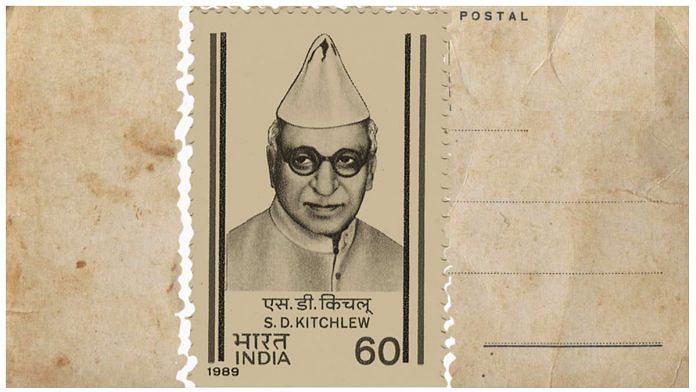New Delhi: Dr Saifuddin Kitchlew, a frontline freedom fighter, an advocate of Hindu-Muslim unity and a barrister, is remembered today as the face of the protests against the Rowlatt Act that the British passed exactly 100 years ago, in 1919.
He was also an educationist who played a major role in the founding of Delhi’s Jamia Millia Islamia University. Kitchlew was the guiding force behind the Naujawan Bharat Sabha, an organisation founded by Sardar Bhagat Singh in 1926.
Introduction to nationalist movement
Kitchlew was born in 1888 in a Kashmiri family of businessmen and government servants. A student of sharp intellect, Kitchlew completed his bachelor’s from Cambridge University and obtained his PhD from Germany. He then returned to Amritsar and started practicing law.
His revolutionary aspirations dated back to his Cambridge days, when he actively participated in majlis, a society formed by Indian students to discuss India’s colonial woes. It was through these meetings that he met India’s future prime minister Jawaharlal Nehru.
F.Z. Kitchlew (Dr Kitchlew’s grandson) writes in his book Freedom Fighter — The Story of Dr Saifuddin Kitchlew, “It was at Cambridge where certain socialistic ideas of Kitchlew were developed… he had always been fascinated by the French Revolution. He read books on these themes, which excited in him a kind of admiration for nationalism and freedom movements.”
Kitchlew was deeply influenced by Mohandas Gandhi and the national movement and left his legal practice to join the same.
Rowlatt Act and Jallianwala Bagh
In March 1919, the Imperial Legislative Council passed the Rowlatt Act, which gave constitutional legitimacy to wartime emergency measures. It empowered the government to gag the press at will, make arrests without warrants and detain political suspects without evidence.
Protests broke out throughout the country against the draconian Act. Kitchlew urged for hartal or general strike, urging people to suspend businesses and take part in non-violent satyagraha against the British government.
Kitchlew’s appeal generated great enthusiasm among the people of Punjab. Around 30,000 people attended his public meeting on 30 March 1919, where Kitchlew’s eloquence gripped the vast audience.
“The message of Mahatma Gandhi has been read to you. All citizens should be prepared for resistance. This does not mean that this sacred town or country should be flooded with blood. The resistance should be a passive one. Do not use harsh words in respect of any policeman or traitor which might cause him pain or lead to the possibility of a breach of peace.”
On 9 April 1919, Kitchlew and Dr Satyapal helmed an anti-government procession that progressed through the heart of Amritsar. The two leaders were arrested, and interned in Dharamsala.
Just a few days later, on that fateful Baisakhi day of 13 April 1919, Brigadier-General Dyer and his troops fired 1,650 rounds of bullets at a peaceful crowd, killing at least 500-600.
The government released Kitchlew in December 1919.
F.Z. Kitchlew notes, “As soon as Kitchlew came out of the prison, a huge crowd gathered in Amritsar and took a historic procession through the city carrying Kitchlew on their shoulders.”
Khilafat and Partition
Kitchlew was appointed chief of the All India Khilafat Committee, whose ideal was pan-Islamism — that all Muslims in India recognise The Caliph of Turkey as their mentor. After Turkey decided to form its government on secular lines, the movement in India failed.
Kitchlew understood the futility of pan-Islamism and became committed to the cause of united nationalism in an atmosphere charged with communal hostility. He maintained that India’s greatest enemy was British imperialism and only united action could defeat it. He strongly opposed the idea of partition along religious lines. He argued that a divided India would only debilitate the Muslim cause, in terms of its political emancipation and economic prosperity.
Both Nehru and Kitchlew believed in Poorna Swaraj or complete self-rule. F.Z. Kitchlew writes, “He was of the opinion that Indian freedom could only be attained through India’s own efforts. According to him, the history of nations that have attained their freedom tell us that self-reliance. self-sacrifice and sufferings are the only road to freedom.”
The aftermath of the Khilafat movement was disastrous for Hindu-Muslim unity. Gandhi, Nehru, Kitchlew and others struggled to bridge that chasm but the damage could never be fully reversed. In fact, the Muslim League became disillusioned with Gandhi and the Congress agenda, ultimately leading to the partition of India on religious lines.
Kitchlew, nevertheless, played a major role in alleviating the tensions, although he wasn’t spared himself. His home in Amritsar was burned to ashes during the communal violence of 1947 and he was forced to take refuge in Delhi, along with his family.
Later his son Taufique Kitchlew, who returned to Amritsar, had to leave his birthplace, since no one was willing to give shelter to a Muslim.
Post-Independence, Kitchlew continued working to restore peace and redefine Soviet-India ties. He became the first Indian to be awarded the Lenin Peace Prize in 1952.
Kitchlew suffered a cardiac arrest and died on 9 October 1963. On his death, Nehru had remarked, “I have lost a very dear friend who was a brave and steadfast captain in the struggle for India’s freedom.
Also read: Zafarnama, the ‘victory letter’ that Guru Gobind Singh wrote to Aurangzeb



